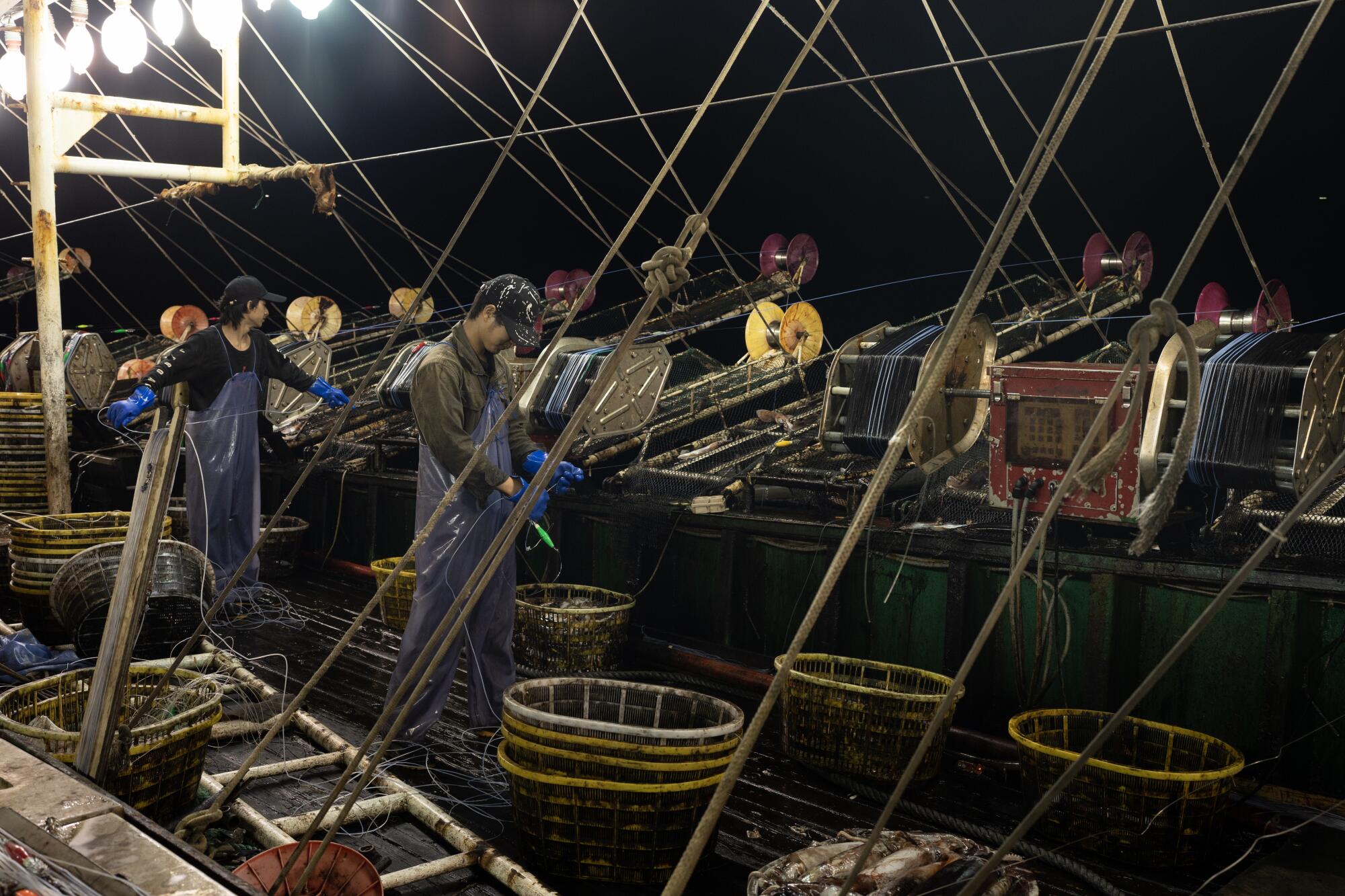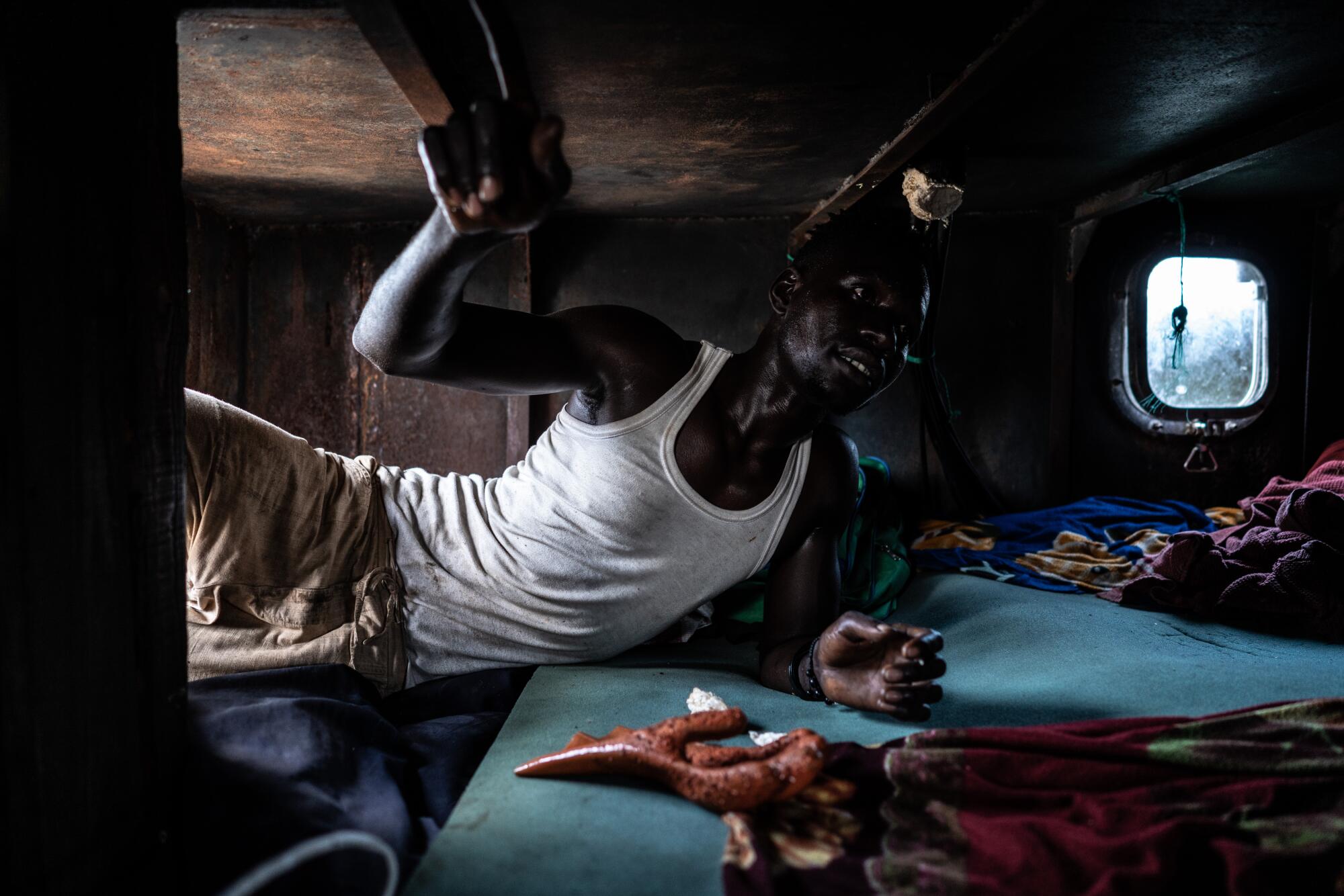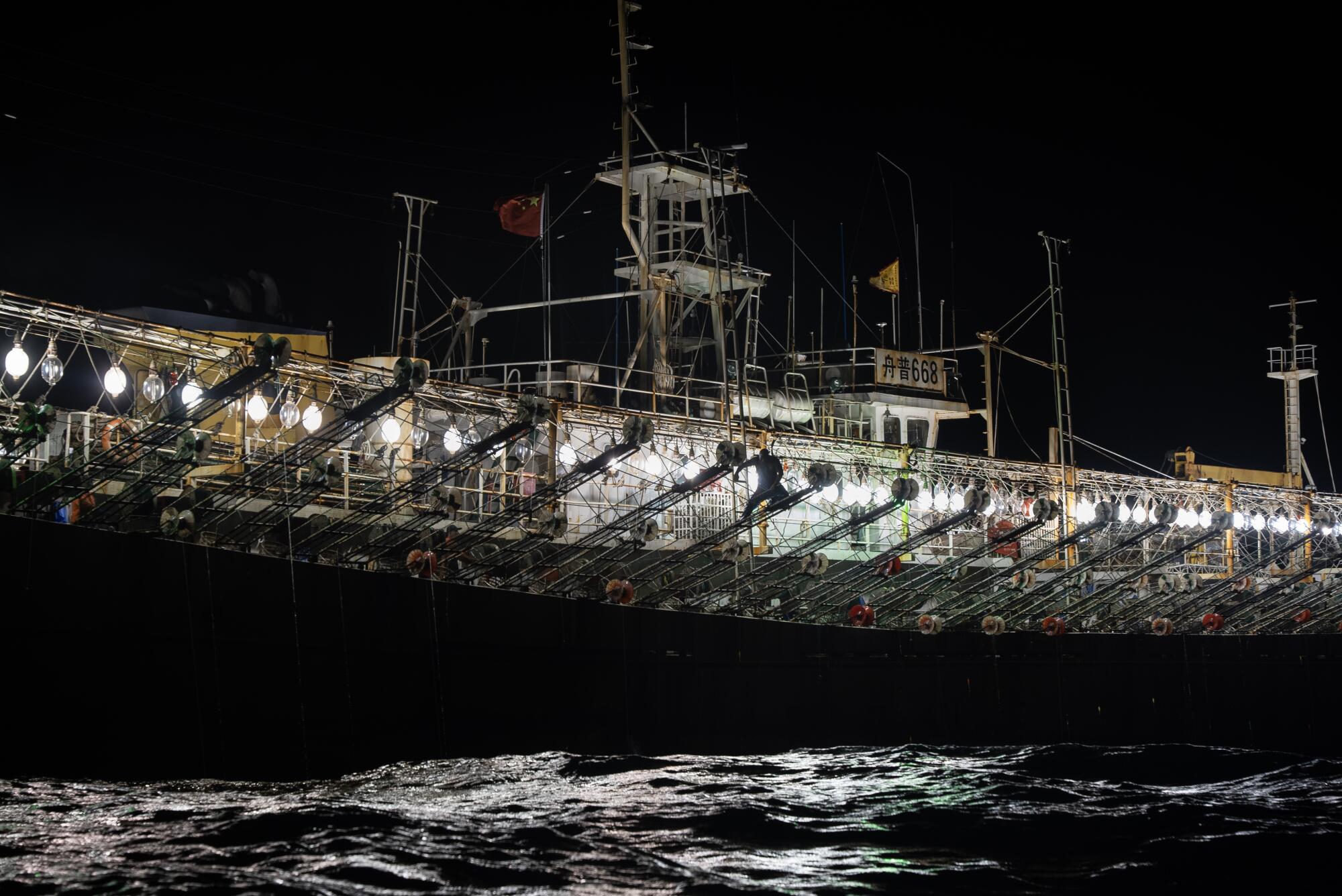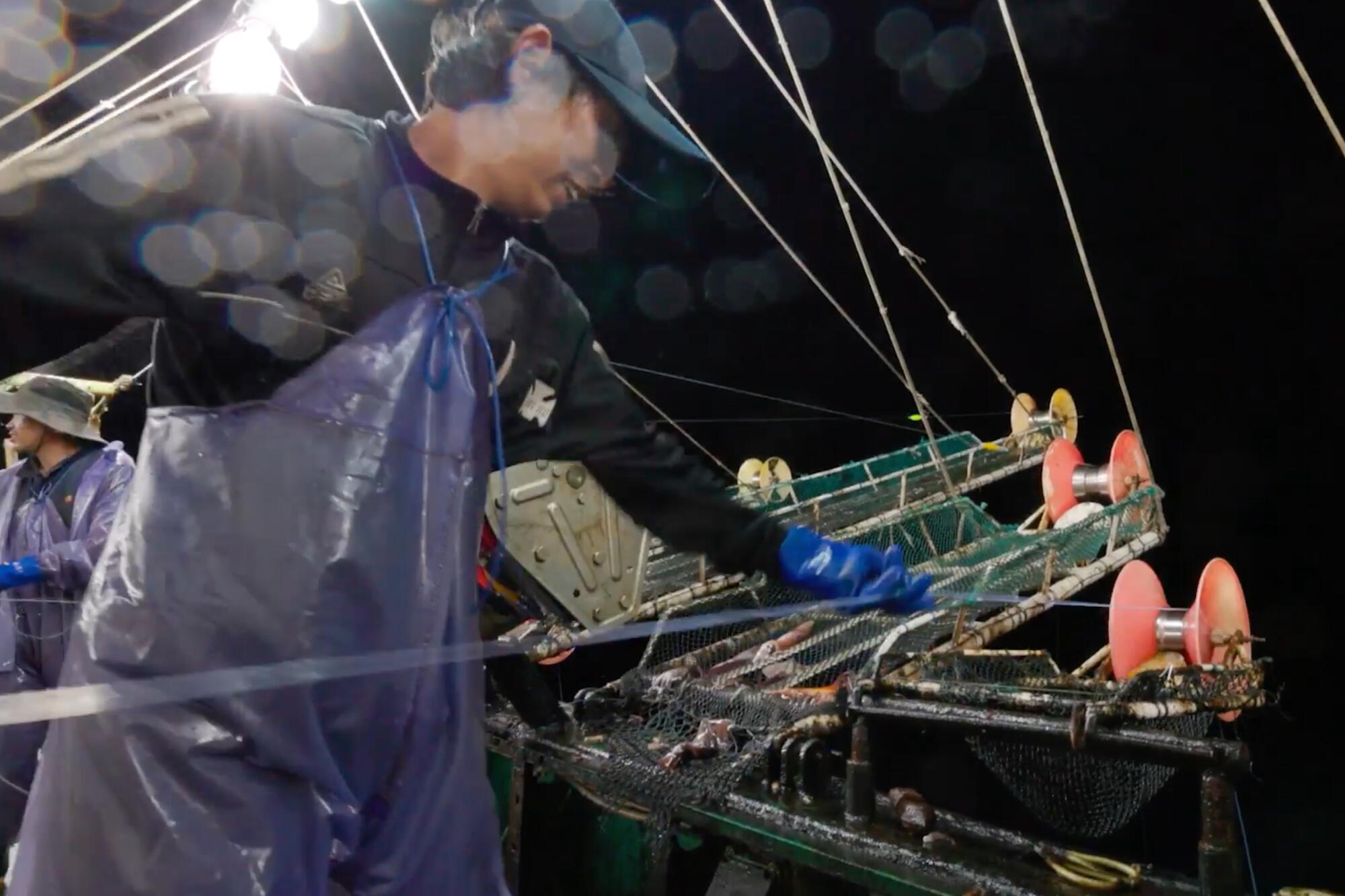This story was produced by the Outlaw Ocean Project, a nonprofit journalism organization in Washington. This article was reported and written by Ian Urbina, Joe Galvin, Maya Martin, Susan Ryan, Daniel Murphy and Austin Brush, with support from the Pulitzer Center.
- Share via
ABOARD THE OCEAN WARRIOR ON THE SOUTH ATLANTIC — On the high seas roughly a thousand miles north of the Falkland Islands, an 18-year-old Chinese deckhand working on a Chinese squid ship nervously ducked into a dark hallway to whisper his plea for help.
“Our passports were taken,” he said to the reporters who had just come aboard. “They won’t give them back.”
Fearing he would be overheard, he typed out a message on his cellphone: “Can you take us to the embassy in Argentina?”
Few workplaces are as brutal as distant-water fishing ships from China, and there are a lot of them: The nation today operates the world’s largest fleet, which is more than double the size of its next competitor. It’s rarely easy for crew members to leave these ships, and often it’s forbidden. Workers on China’s vast armada of squid ships, which make up the majority of the vessels in the fleet, typically spend two years almost entirely at sea, most of the time with no internet or phone signal.
China is widely accepted to be the world’s worst purveyor of illegally caught seafood, and its practices have received so much attention that the country has taken steps in the last several years to reduce such violations. But the human rights abuses taking place on its ships — far out at sea, away from public view — have attracted less notice and so remain rampant.
Workdays routinely last 15 hours, six days a week. Crew quarters are cramped, with 10 men bunking in rooms built for half that number. Injuries, malnutrition, illness and beatings are common, according to interviews with dozens of crew members on the ships.
Occasionally, crew members have escaped and reported on conditions themselves. In 2014, for instance, 28 Africans fled a Chinese squidder called the Jia De 1 while it was anchored in the Uruguayan capital, Montevideo. Some of them later told local reporters they had been beaten on the ship. One, who described having been chained up when not working, showed reporters what he said were shackle marks around his ankles. At the time, the owner of the ship denied having mistreated the crew in any way.

“The cases I see don’t tend to look like accidents,” said Jesica Reyes, whose job as an interpreter for Indonesians in Montevideo has given her an up-close view. “They look like abuse.”
For the last decade, Reyes has fielded hundreds of emergency phone calls from fishing-company agents, police, deckhands and the Indonesian Consulate, imploring her to get to the port to talk to families of deckhands, line up lawyers for repatriations or wage disputes and work with police or doctors when ships drop off Indonesian crew members who are sick, injured, disgruntled or dead.
Chinese officers regularly beat Indonesian deckhands for mistakes, slights or slowness, Reyes said. She recounted one case involving an Indonesian named Daniel Aritonang who was dropped off in port in March 2021, after having been transferred from a Chinese squid ship called the Zhen Fa 7. Barely conscious, covered in bruises, his feet swollen from malnutrition, Aritonang had ligature marks from a rope he said had been tied around his neck. He died at the hospital several hours later. Asked about the case, a representative for Rongcheng Wangdao, the company that owns the Zhen Fa 7, said it found no evidence of misconduct on the ship: “There was nothing regarding your alleged appalling incidents about abuse, violation, insults to one’s character, physical violence or withheld salaries.”
The U.S. Department of Labor has examined the problem of labor abuse on Chinese squid ships, concluding in 2020 that many deckhands worked involuntarily under conditions of coercion, fraud, intimidation or debt bondage. In 2021, the Environmental Justice Foundation, an advocacy group based in London, released a report based on interviews with 116 Indonesian crew members from Chinese ships. Roughly 97% reported experiencing some form of debt bondage or confiscation of documents. About 85% reported abusive working and living conditions, 70% had experienced intimidation and threats, and 58% had seen or experienced physical violence.
“The cases I see don’t tend to look like accidents. They look like abuse.”
— interpreter Jesica Reyes
“The conditions inside the boats are not the best, and the work is tough,” said Nicolas Potrie, who runs the Indonesian Consulate office in Montevideo, adding that injured or sick workers who are dropped off in port are often reluctant to explain what happened to them, fearing retribution. Given these conditions, China has struggled in recent years with strikes, mutinies and violence on its squid ships, which feed the world’s growing demand for calamari.
To get paid in full, crews on Chinese fishing ships usually have to complete the entire term of their contracts, which often include heavy financial penalties for attempting to leave prematurely. This type of provision in a job contract violates anti-trafficking laws in the U.S. and Indonesia, according to labor lawyers in both countries.
When Chinese fishing ships visit their waters, some countries have been reluctant to provide asylum or safe passage for injured, sick or disgruntled crew members seeking to disembark, because such cases raise complicated diplomatic challenges over whether the workers should be allowed to stay or be sent back home. In October 2015, for example, the Chinese crew on a squid jigger called the Ningtai 89 went on strike after the ship owner tried to pay lower wages than he originally promised. The crew members insisted that they wanted to disembark and be flown home, but the company balked.
The strike soon escalated into a mutiny, with the crew forcing the ship into the Peruvian port of Callao — where the navy pushed the vessel back out to sea. The crew forced the ship back into the port, this time running it aground. Local police considered the event an illegal entry, and the Foreign Ministry, citing violations of the country’s immigration procedures, lodged a complaint with the Chinese Consulate. Five days later, the crew was allowed entry into Peru and flown to China, where the leader of the strike was prosecuted and convicted of hijacking.

To chronicle conditions on Chinese distant-water squid ships, a team of reporters boarded more than two dozen vessels at sea to speak with crew members or pulled alongside vessels to interview Chinese officers by radio. In many instances, the Chinese ships got spooked, pulling up their gear and fleeing the scene, and the reporters trailed the ships in a smaller and faster skiff to get close enough to throw onto their aft decks a plastic bottle weighed down with rice. Each bottle contained a pen, cigarettes, hard candy and interview questions written in English, Chinese and Indonesian. On several occasions, deckhands wrote replies, providing phone numbers for family back home, and then threw the bottles back into the water. The reporting included interviews with their family members, and with two dozen additional crew members.
On the Lu Lao Yuan Yu 010, a Chinese trawler fishing on the North Atlantic Ocean off the coast of Gambia, a Senegalese deckhand named Lamin Jarju gave a tour of his living quarters, a nest of crumpled newspapers, clothing and blankets located outside atop the roof of the wheel room. As he entered, a rat scurried out from under a tarp. Several crew members, he explained, had been sleeping in these quarters ever since the captain hired more workers than the ship could accommodate. “They treat us like dogs,” Jarju said. The ship’s owner, Qingdao Tangfeng Ocean Fishery, declined to respond to questions.

On a different Chinese trawler in the area, the Victory 205, African deckhands showed where eight men slept in a space meant for two. The 4-foot-tall steel-sided compartment sat directly above the engine room, which made it dangerously hot. When high waves crashed on board, water flooded the makeshift cabin, where, the workers said, an electrical power strip had twice sparked, nearly setting their mattresses on fire.
In Punta Arenas, Chile, a dozen rusty Chinese squid ships were anchored a mile from port. The vessel carrying the team of journalists was crewed primarily by Chileans, who pointed to one of the anchored ships and recounted recently watching the Chinese captain punch and slap deckhands who appeared to be Filipinos or Indonesians. The captain stopped only after the Chileans began screaming at him. “It was brutal, like 15 minutes straight of beating,” one said.
Roughly 350 miles west of the Galapagos Islands, in the Pacific Ocean, the reporters got a close-up look at the conditions aboard a Chinese squid ship.
On deck, both sides of the vessel were festooned with 300 or more bowling-ball-sized light bulbs, which hung on racks for the purpose of enticing squid up from the depths. At night, when the bulbs were turned on, the effect was blinding and made the surrounding blackness feel stark, timeless, otherworldly. The glow of a squid boat with its lights on is visible at sea to the naked eye more than a hundred miles away.

Scores of fishing lines extended out into the water under the lights, each bearing a specialized squid hook, known as a “jig.” When a squid latched onto a line, the reel automatically flipped it onto a metal rack. The deckhands then tossed it into plastic baskets for sorting. Often these baskets overflowed, and the deck floor filled shin-deep with squid, leaving virtually no place left to walk. The squid became translucent in their final moments, their skin losing its pale red tint, sometimes accompanied by a final hissing or coughing sound.
The stink and stain of squid are virtually impossible to wash from clothes. Bigger ships have laundry machines, but on smaller ones, the crew members tie their dirty clothes together to form a long rope, occasionally stretching 20 feet, that they drag for hours in the sea behind the ship.
When the crew members were not fishing, they weighed, measured, washed, sorted, eviscerated or packed the squid into metal trays for freezing and bagging. They prepared bait by carving up caught squid, separating the tongues from inside the beaks and cutting out the soft tissue around the beaks. Below deck, they had daily duties: sweeping hallways, scrubbing toilets, mopping showers.
The ship had been at sea for four months and had long since run out of vegetables and fruit.

Since the beginning of the pandemic, the Chinese distant-water fishing fleet has shifted away from recruiting foreign deckhands, relying instead mostly on Chinese workers, many of them from rural and inland regions of the country. More than 292 million people migrated in 2021 within China.
On Zhihu, an anonymous Chinese question-and-answer website similar to Quora, former crew members from these ships routinely warn about conditions on the vessels. Posts on the website describe debt-bondage schemes in which labor recruiters target farmers and factory workers. In a cautionary video posted in 2020, a narrator recounted what he described as a friend’s experiences working on a distant-water squid ship. “Always be wary of these offshore fishing companies’ schemes,” he said, noting that regular workdays last 13 to 14 hours but that when the squid are abundant, deckhands have to stay awake for three straight days and nights. Labor recruiters sometimes target the desperate. One recent online advertisement for a job on a Chinese squid ship said: “If you are in debt, your family has shunned you, you don’t want to be looked down on, turn off your phone and stay far away from dry land.”
Deckhands are often lured to port cities with promises of lucrative contracts, only to discover that to get a job they have to pay a series of fees, typically upfront or with a loan from agents who recruit workers for jobs at sea, according to a news story published online by Shandong Television in April 2015. These fees, which amount to several months of wages, cover such expenses as travel to the ship, job training, insurance, bedding, crew certifications, medical checkups, food and protective workwear.
“If you are in debt, your family has shunned you, you don’t want to be looked down on, turn off your phone and stay far away from dry land.”
— recruitment ad targeting the desparate
Confusing or misleading contracts have resulted in numerous court cases. In a study of labor disputes involving commercial fishing between 2016 and 2020, the Ningbo Maritime Court in Zhejiang province found that most — 180 out of 267 — concerned labor contracts, typically involving crew members who had left their ships before their contracts had expired, often because the captain had allegedly reneged on promised pay. The study found that vaguely written or verbal contracts make it virtually impossible for workers to collect unpaid wages and injury compensation.
China’s Supreme Court has also weighed in on the situation, declaring in 2020 that better protection was needed for “wages, remuneration, and other relevant expenses [that] relate to the basic survival, physical and mental health, and personal dignity of seafarers.”
Still, only rarely does the press in China highlight labor conditions aboard the country’s fishing fleet. “A seafarer’s labor dispute won’t be easily noticed by the public, unless there is a protest or some sort of high-profile case,” said Yin Chi, a former judge from China now based at the NYU School of Law.
One such case, which riveted the country for weeks, was a gruesome mutiny that took place aboard the Lu Rong Yu 2682 in 2011. The lead mutineer was a deckhand named Liu Guiduo. Before departing from Shidao port, Liu, a three-pack-a-day smoker, had bought 165 cartons of cigarettes from the captain on credit, stacking them next to his bunk, floor to ceiling. After leaving shore, the ship’s captain informed the crew members that they would not be paid a fixed salary, as they had been promised, but instead would receive payment based on a percentage of their catch. After realizing that his earnings probably would not even cover what he owed for the cigarettes, Liu recruited nine other crew members to take the captain hostage.
Over the next five weeks, the ship split into warring factions that saw men disappearing at night, crew members tied up and tossed overboard to drown, and engine equipment sabotaged, according to Chinese news reports and court records. Stranded at sea, the crew members eventually managed to restore the ship’s communications system and transmit a distress signal, drawing two Chinese fishing vessels to their aid. Eleven of the original 33 men made it back to shore.
In 2013, five of the accused, including Liu and the ship’s captain, were sentenced to death, one crew member was given a suspended death sentence, and the other five received terms of between four years and life in prison.

China has taken some limited steps recently to prevent strikes, mutinies and violence on its fishing ships. Police departments in Chinese port cities have begun using satellites to communicate directly with some distant-water fishing vessels, even monitoring real-time onboard surveillance video.
In March 2020, a dozen Chinese workers on a Chinese squid ship anchored near the coast of Peru went on strike, frustrated at not being able to return home because of China’s pandemic controls. The Chinese fishing company contacted the police in Zhejiang province, who spoke directly to the crew by satellite phone. The police officer who listened to their grievances arranged for a psychologist to hold therapy sessions with the crew members remotely to help alleviate their stress.

The police officer also explained to the workers that their options were to transfer to other vessels and come home on a supply ship, which would take about a month, or to return to shore in Peru and fly back to China, but at their own expense. The men opted to return to work and stick it out.
Some provinces in China fund medical ships to shadow distant-water fishing fleets based in their ports. “If a patient is too sick for us to handle, we drop him in Peru,” an officer on the bridge of the Zhe Pu Yuan 98, a squid ship that doubles as a floating hospital, said over the radio when visited by a reporter roughly 400 miles from the Galapagos in the Pacific Ocean. In 2021, the Zhe Pu Yuan 98 replaced the Pu Yuan 801, which over the previous five years had treated nearly 300 crew members, escorted more than 20 critically ill crew members to the port of Lima and completed the rescue of five fishing boats that had lost power.
The Chinese government has also tried to address mental-health issues that contribute to violence on such ships. In June 2018, a Chinese crew member on a Chinese squid ship anchored in Peruvian waters got into a knife fight with a Filipino colleague, during which the Filipino jumped overboard to his death. The Chinese government responded by creating in Chimbote, Peru, a Communist Party chapter specifically for fishing-boat workers abroad. The purpose of the chapter was, according to the party branch secretary, to avoid similar violence by improving the morale of squid-fishing crews abroad and by bolstering the “spiritual sustenance, support in life, and security in production.”

On the Chinese squid ship north of the Falklands, where in February 2022 the 18-year-old begged to be taken to the Chinese Embassy in Argentina, another deckhand, who was 28, explained that it was his first time at sea. He earned $883 per month, adding that if he and his fellow deckhands missed a day of work for sickness or injury, they were docked two days’ pay.
“It’s impossible to be happy,” he said. “We care about nothing because we don’t want to be here, but we are forced to stay.” He estimated that 80% of the men would leave if they were allowed. “It’s like being isolated from the world and far from modern life.”
A minder who kept watch on the men was temporarily called away, which allowed the deckhands to continue their frank exchange with the reporter. “I can’t disclose too much right now given I still need to work on the vessel, if I give too much information it might potentially create issues onboard,” the 18-year-old wrote on his cellphone. “Please contact my family,” he said, before abruptly ending the conversation when the minder returned.
Port records in Montevideo offered little additional information about the 18-year-old’s ship, except to indicate that it had dropped off a dead worker in April 2019. Contacted at her home in Fujian province, the older sister of the 18-year-old deckhand was told of his plea for help. “My heart really aches,” she said.
She explained that being from inland, she and her family knew little about the fishing industry, though they had been skeptical and had begged her brother to not work at sea. They had encouraged him to consider other options, including being a police officer, but he was drawn to the idea of seeing other countries.
“He’s really too young,” she said. “And now there is nothing we can do, because he’s so far away.”
More to Read
Sign up for Essential California
The most important California stories and recommendations in your inbox every morning.
You may occasionally receive promotional content from the Los Angeles Times.













